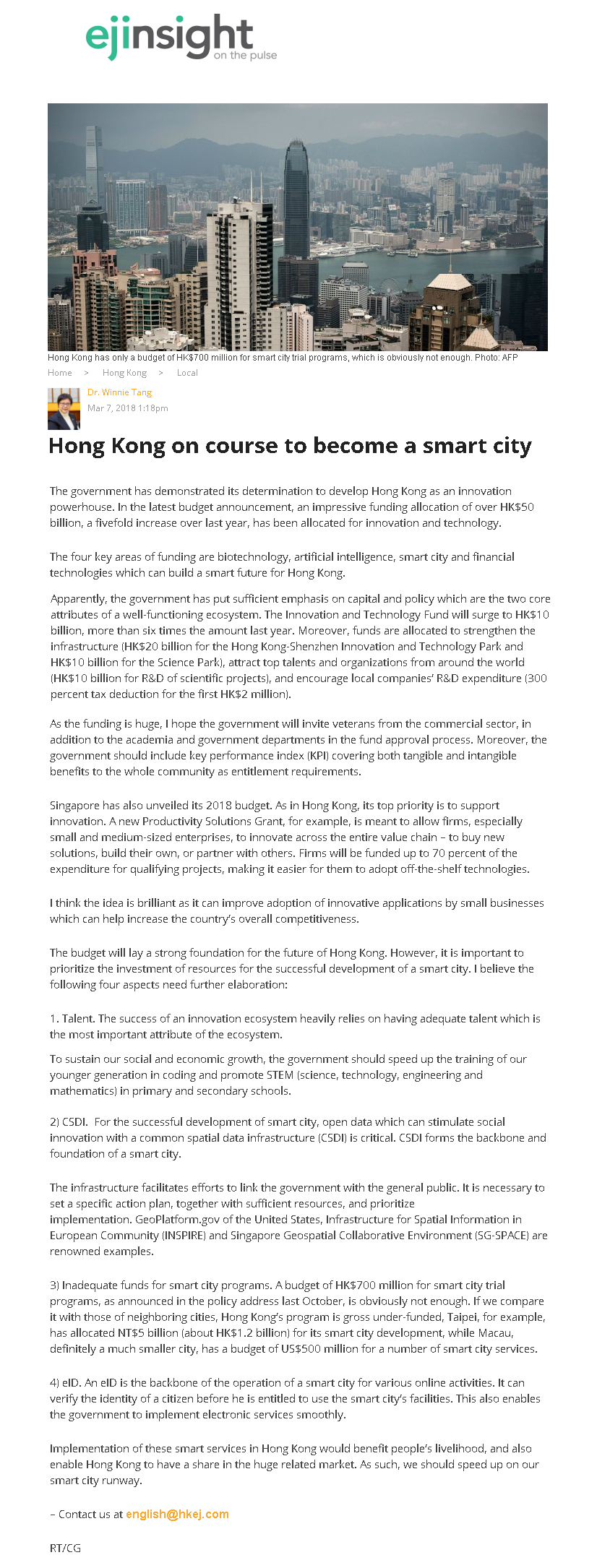網上版請按此

Hong Kong on course to become a smart city
The government has demonstrated its determination to develop Hong Kong as an innovation powerhouse. In the latest budget announcement, an impressive funding allocation of over HK$50 billion, a fivefold increase over last year, has been allocated for innovation and technology.
The four key areas of funding are biotechnology, artificial intelligence, smart city and financial technologies which can build a smart future for Hong Kong.
Apparently, the government has put sufficient emphasis on capital and policy which are the two core attributes of a well-functioning ecosystem. The Innovation and Technology Fund will surge to HK$10 billion, more than six times the amount last year. Moreover, funds are allocated to strengthen the infrastructure (HK$20 billion for the Hong Kong-Shenzhen Innovation and Technology Park and HK$10 billion for the Science Park), attract top talents and organizations from around the world (HK$10 billion for R&D of scientific projects), and encourage local companies’ R&D expenditure (300 percent tax deduction for the first HK$2 million).
As the funding is huge, I hope the government will invite veterans from the commercial sector, in addition to the academia and government departments in the fund approval process. Moreover, the government should include key performance index (KPI) covering both tangible and intangible benefits to the whole community as entitlement requirements.
Singapore has also unveiled its 2018 budget. As in Hong Kong, its top priority is to support innovation. A new Productivity Solutions Grant, for example, is meant to allow firms, especially small and medium-sized enterprises, to innovate across the entire value chain – to buy new solutions, build their own, or partner with others. Firms will be funded up to 70 percent of the expenditure for qualifying projects, making it easier for them to adopt off-the-shelf technologies.
I think the idea is brilliant as it can improve adoption of innovative applications by small businesses which can help increase the country's overall competitiveness.
The budget will lay a strong foundation for the future of Hong Kong. However, it is important to prioritize the investment of resources for the successful development of a smart city. I believe the following four aspects need further elaboration:
1. Talent. The success of an innovation ecosystem heavily relies on having adequate talent which is the most important attribute of the ecosystem.
To sustain our social and economic growth, the government should speed up the training of our younger generation in coding and promote STEM (science, technology, engineering and mathematics) in primary and secondary schools.
2) CSDI. For the successful development of smart city, open data which can stimulate social innovation with a common spatial data infrastructure (CSDI) is critical. CSDI forms the backbone and foundation of a smart city.
The infrastructure facilitates efforts to link the government with the general public. It is necessary to set a specific action plan, together with sufficient resources, and prioritize implementation. GeoPlatform.gov of the United States, Infrastructure for Spatial Information in European Community (INSPIRE) and Singapore Geospatial Collaborative Environment (SG-SPACE) are renowned examples.
3) Inadequate funds for smart city programs. A budget of HK$700 million for smart city trial programs, as announced in the policy address last October, is obviously not enough. If we compare it with those of neighboring cities, Hong Kong's program is gross under-funded, Taipei, for example, has allocated NT$5 billion (about HK$1.2 billion) for its smart city development, while Macau, definitely a much smaller city, has a budget of US$500 million for a number of smart city services.
4) eID. An eID is the backbone of the operation of a smart city for various online activities. It can verify the identity of a citizen before he is entitled to use the smart city's facilities. This also enables the government to implement electronic services smoothly.
Implementation of these smart services in Hong Kong would benefit people's livelihood, and also enable Hong Kong to have a share in the huge related market. As such, we should speed up on our smart city runway.
Dr. Winnie Tang
Honorary Professor, Department of Computer Science, The University of Hong Kong